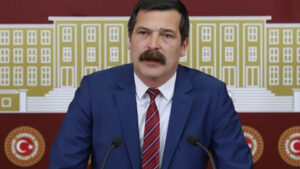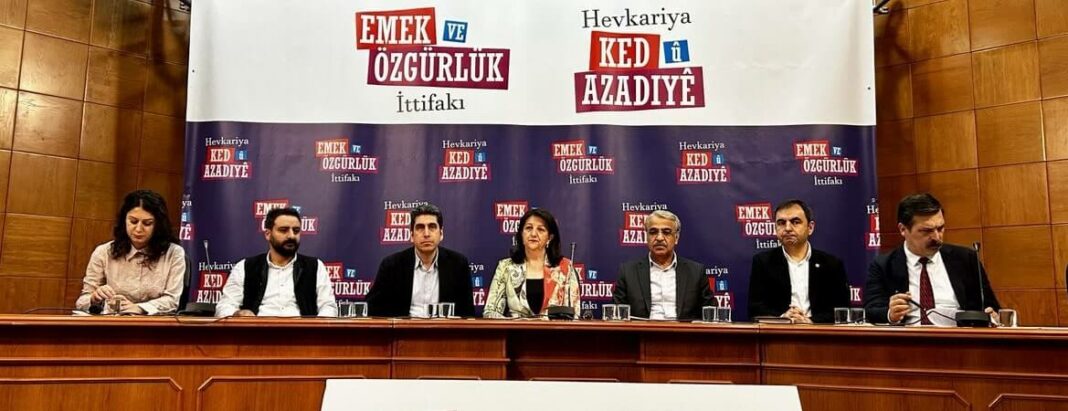Bünyamin Tekin
After the release of Vladimir Lenin’s 21 conditions for admitting members to the Communist International (Comintern), socialist organizations became highly factionalized, and in many countries, like Turkey, the ones who did not follow Lenin’s doctrinaire approach found more success among the lower classes.
Experiencing enormous challenges and chafing under the boot of military rule could not unite Turkish socialists.
A shouting match on Turkish TV encapsulates their endless fragmentation.
In December 1995 journalist Mehmet Ali Birand hosted three prominent leftist figures of the time: Maoist-turned-Kemalist Doğu Perinçek and guerillas-turned-politicians Ertuğrul Kürkçü and Bülent Uluer. The conversation was chaotic, with individuals talking over each other, making accusations, and shouting insults such as “dönek” (traitor), “ahlâksız” (immoral), “terbiyesiz” (rude, uncivilized), “zavallı” (pitiful), “alçak” (lowlife) “puşt” (scoundrel), “palavracı” (liar) and “bezirgân” (huckster). At the climax of the exchange, there is a moment where Perinçek accuses Kürkçü of defending Ottoman Sultan Abdulhamid II, a beloved figure for Turkey’s Islamists and a hated symbol of the ancien régime for the leftists, which in itself became an out-of-context meme.
Doğu Perinçek, Ertuğrul Kürkçü, Bülent Uluer (1995) pic.twitter.com/weXXGZnztJ
— 32. Gün Arşivi (@32gunarsivi) September 14, 2019
Perinçek: You defended Abdulhamid!
Kürkçü: I didn’t defend him!
Perinçek: You defended [Adnan] Menderes [Turkey’s prime minister between 1950-60]!
Kürkçü: I didn’t defend him!
Perinçek: You did defend him!
Kürkçü: Shameless!
Uluer: Doğu…
Perinçek: Look!
Kürkçü: I didn’t defend him! Show me the proof!
Uluer: Doğu…
Perinçek: I’ll show you now.
Kürkçü: You’re a disgusting man!
Perinçek: You’re a lowlife bastard!
These insults are emblematic of the strong enmity leftists of different factions held against each other.
After decades of strife and factionalism, Turkish socialists reckoned that it was in their best interest to get over such childish divisions that led to comical shouting matches between all-too-serious middle-aged men.
The new faces of socialism in Turkey
The new faces of Turkish socialism are attractive younger men whose fan-made clips get thousands of shares on social media platforms.
🎶 'Erkan Baş – Aşkın Olayım'
📍 Sosyal medya bu videoyu konuşuyor pic.twitter.com/1hhZvdMqNO
— Gerçek Gündem (@gercekgundem) March 10, 2023
As the presidential and parliamentary elections scheduled for May 14 approach, a relatively new political force, the Workers’ Party of Turkey (TİP), has gained ground, making waves with its leftist agenda. The leaders of the contemporary TİP claim that the party is a successor to the original TİP that was founded in 1961.
Emerging from a 2017 split in the Communist Party of Turkey (TKP), TİP, led by former TKP chairman Erkan Baş, has established itself as a force in Turkish politics. Advocating for a socialist transformation in the country, TİP has made strides in recent years by focusing on issues such as poverty, corruption, gender inequality and discrimination against minority groups.

TİP has been generating excitement and interest in the country, particularly among the younger generations. According to experts, the party has been visible in nearly every public opinion poll, competing with parties established by long-time politicians. TİP’s support ranges between 1 and 2 percent, but its ambition lies in making its presence known and possibly becoming a central force in future elections.
Türkiye: left-wing TİP (*) reached a record high in the latest Yöneylem poll: 3.3%.
The party is currently in an alliance with HDP (S&D) under Labour and Freedom Alliance (S&D).
➤ https://t.co/hZWwljA0ON#TİP pic.twitter.com/fM4UvYXqSi
— Europe Elects (@EuropeElects) March 26, 2023
TİP draws its support mainly from grassroots efforts and street-level activism and defines itself as a collective force that unites workers, the unemployed, youths, retirees, women and men in the struggle for basic rights and freedoms. The party’s four MPs — Erkan Baş, Sera Kadıgil, Ahmet Şık and Barış Atay — have shown tremendous personal effort and charisma in promoting the party. In recent times TİP has drawn popular figures from the art and media sectors as parliamentary candidates, which has increased the party’s visibility. This has been particularly notable with the TİP’s nomination of celebrities like Mehmet Aslantuğ, Cezmi Baskın and İrfan Değirmenci as MP candidates. However, this strategy raises some questions, such as how the party will manage the balance between attracting well-known personalities and prioritizing the needs of its constituents.

In the 2018 general election, the TİP entered into an electoral alliance with the pro-Kurdish Peoples’ Democratic Party (HDP). This partnership allowed TİP to overcome election eligibility requirements and have its representatives, such as Baş and actor-turned-politician Atay, elected to the Turkish Parliament on HDP lists. The alliance has since been formalized into the Labor and Freedom Alliance, which also includes other left-wing parties such as the Labor Party (EMEP).
However, the alliance has sparked controversy and debate over the political ambitions of TİP.
Turkey will hold presidential and parliamentary elections on May 14. Recep Tayyip Erdoğan, who was first elected president in 2014, is seeking re-election, while an opposition bloc of six parties has nominated main opposition leader Kemal Kılıçdaroğlu as their joint candidate.
The HDP is lending outside support to Kılıçdaroğlu’s candidacy by not fielding its own candidate.
The HDP, the third largest party in parliament, is not included in the opposition bloc, known as the Nation Alliance, due to the İYİ (Good) Party’s dislike of the HDP on allegations that the party has links to the outlawed Kurdistan Workers’ Party (PKK), which is listed as a terrorist organization by Turkey and much of the international community.
The HDP faces a closure case, launched in March 2021, due to its alleged links to the PKK, which has been waging a bloody war in Turkey’s Southeast since 1984. The party denies any links to the PKK.
The HDP announced its decision last month to run in the elections under the banner of another party, the Green Left Party (YSP), to circumvent the risks that could emerge from its possible closure ahead of the elections.
In the past when pro-Kurdish parties faced similar threats, they either fielded independent candidates or ran under the umbrella of other parties.
The challenges facing the TİP-HDP alliance
The YSP, under which the HDP will run in the race as it faces a closure case, the Social Freedom Party (TÖP), the Labor Movement Party (EHP) and the Union of Socialist Councils (SMF), and EMEP have reached a consensus to run in the elections with a joint list to maximize the chances of gaining seats in parliament since the electoral system favors a consolidated vote rather than a vote split among several parties.
The use of joint lists can have advantages in terms of consolidating votes, but it may also lead to some voters feeling disenfranchised if their preferred party is not competing in their province.
Confident of its following, TİP decided not to run with the joint list of the alliance, which caused cracks between TİP and the HDP.
Some HDP figures have accused TİP of exploiting the HDP’s pro-Kurdish base to overcome the election threshold while producing rival candidates in major cities, potentially splitting the vote and harming the chances of the alliance.
🔵Hayko Bagdat wrote: Why are Kurdish voters disillusioned with the Workers’ Party of Turkey?
📌#Turkey’s leftist movement has historically failed where risky topics, such as the Armenian genocide and the Kurdish question, were at issue.
✒️ @haykobagdathttps://t.co/BaVqtS1UVo pic.twitter.com/TRYNruoVvX
— GercekNews (@newsgercek) April 6, 2023
Journalist Hayko Bağdat, writing for the Artı Gerçek news website, has delved into the debate.
Bağdat cites the concerns expressed by Gültan Kışanak, a former co-mayor of Diyarbakır, and Selahattin Demirtaş, a former co-chair of the HDP, regarding the alliance with TİP. Kışanak recently wrote a letter from prison and claimed that the alliance is no longer a true election partnership due to the lack of a common presidential candidate and a joint election list. She argued that the Kurdish vote was crucial in breaking the electoral threshold in the 2015 elections and that the HDP has worked tirelessly to overcome this obstacle, and that the party should not be taken for granted.
Demirtaş also expressed disappointment with TİP’s decision, urging socialists and democrats to support the HDP and its Green Left Party list. Bağdat notes that TİP’s focus on attracting non-Kurdish voters has raised concerns among the Kurdish community, fearing that their struggle for equality and justice will be ignored or marginalized.
The HDP’s success in recent years has largely been due to its ability to unite various factions of the Turkish left and minority groups under one umbrella. The partnership with TİP was initially seen as a continuation of this unifying trend. However, the growing concerns about the nature of the alliance have led to questions about whether it can truly serve the interests of all its constituents, including the Kurdish community.
In response to the criticism, TİP has maintained that its alliance with the HDP remains strong and mutually beneficial. Party representatives argue that their joint efforts aim to challenge the ruling Justice and Development Party and its ally, the Nationalist Movement Party (MHP), by presenting a unified front for progressive and democratic forces in the country.
With the country facing an economic crisis and the government’s poor response to two major earthquakes on Feb. 6 that killed more than 50,000, many believe the AKP and President Erdoğan are more vulnerable now than at any point in their two-decade rule.
The risk of TİP being seen as the ‘party of white Turks’
Another issue is the potential risk of TİP becoming known as the “party of white Turks,” particularly as the party’s popularity grows, journalist Murat Sabuncu contends. The term “white Turks” refers to the country’s secular, Westernized elite, and being associated with this group could have implications for TİP’s future success. The party must strike a balance between maintaining its progressive image and avoiding the risk of being seen as catering solely to a specific demographic, according to Sabuncu.
As the elections draw near, tensions within the alliance will likely continue to be scrutinized. The outcome of the elections could significantly impact the future direction of both TİP and the HDP as well as their relationship with one another. If the alliance is successful in gaining seats and influence, it could signal a new era of left-wing politics in Turkey, characterized by a more unified and cohesive front against the ruling conservative forces.
However, if the leftist alliance struggles to secure a strong electoral showing, it may lead to further divisions and introspection among the various factions within the Turkish left. This could undermine the TİP-HDP partnership and potentially hinder the prospects for progressive politics in the country.

